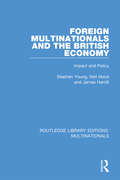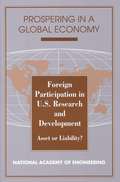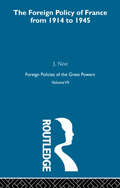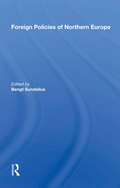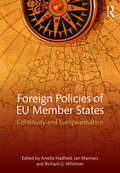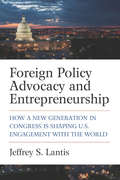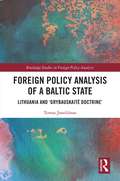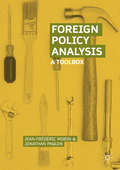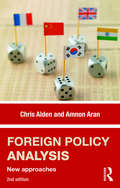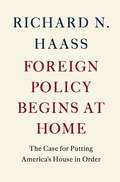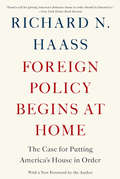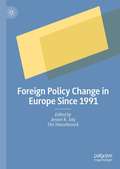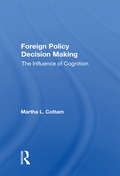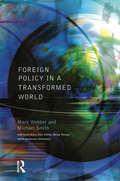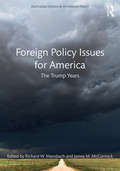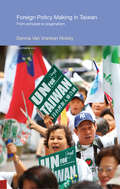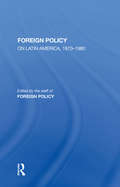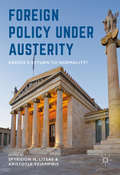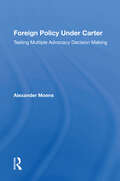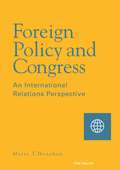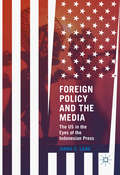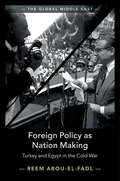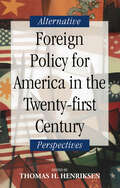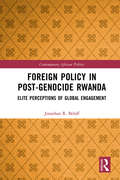- Table View
- List View
Foreign Multinationals and the British Economy: Impact and Policy (Routledge Library Editions: Multinationals)
by Stephen Young Neil Hood James HamillThis book, first published in 1988, examines the impact of multinational companies on the British economy and the British government’s policy responses. It assesses the effects of multinationals both on the national economy and on different regions and evaluates the benefits and problems brought by overseas companies. It looks at how government has attempted to entice multinationals to invest, and the UK government’s success in these attraction efforts as compared with other countries. Regulatory aspects of policy are also reviewed and evaluated, and consideration is given to possible new policy approaches. This title will be of interest to students of business studies.
Foreign Participation in U.S. Research and Development: Asset or Liability?
by Development Committee on Foreign Participation in U.S. ResearchDuring the past decade, foreign participation in U.S. research and development--through acquisition of R&D-intensive businesses, links with universities, and other arrangements--has expanded rapidly.This emergence of foreign influence has drawn a mixed response--some regard the trend as a positive corollary to the expanding involvement of U.S.-owned companies in national markets abroad. Others consider it a net liability for Americans that often benefits foreign companies and their home economies at U.S. expense.There exists a large gap in expert and public understanding of the drivers, nature, and consequences of foreign participation in the nation's technology enterprise. This volume seeks to close this gap and reviews The nature of R&D activities and how they contribute to economic development. The causes, scope, and nature of foreign involvement in U.S.-based R&D activity and the associated costs, risks, benefits, and opportunities of this trend. The merits and liabilities of policies to regulate foreign R&D participation.
Foreign Pol France 1914-45 V7
by NereFirst published in 2001. Routledge is an imprint of Taylor & Francis, an informa company.
Foreign Policies Of Northern Europe
by Bengt SundeliusThis cross-national treatment of the foreign policies of Northern Europe—Denmark, Finland, Iceland, Norway, Sweden—is organized by substantive policy areas rather than by country, thus allowing most-similar-case analyses of several dimensions of the countries' international relations. The authors make comparisons among the countries in each area of investigation and present details of security, international development, and neighborhood and foreign policy processes. They also describe and explain international and domestic forces that shape the region's external policies. The combination of sound, empirically based data and attention to broader international and theoretical interests allows relevant comparisons with other advanced industrial states.
Foreign Policies of EU Member States: Continuity and Europeanisation
by Richard G. Whitman Ian Manners Amelia HadfieldForeign Policies of EU Member States provides a clear and current overview of the motivations and outcomes of EU Member States regarding their foreign policy-making within and beyond the EU. It provides an in-depth analysis of intra-EU policy-making and sheds light, in an innovative and understandable way, on the lesser-known aspects of the inter-EU and extra-EU foreign policies of the twenty-eight Member States. The text has an innovative method of thematic organisation in which case study state profiles emerge via dominant foreign policy themes. The text examines the three main policy challenges currently faced by the twenty-eight Member States: First, EU Member States must cooperate within the mechanisms of the EU, including the Common Foreign and Security Policy (CFSP). Second, EU Member States continue to construct their own inter-EU foreign policies. Third, the sovereign prerogative exercised by all EU Member States is to construct their own foreign policies on everything from trade and defence with the rest of the world. This combination of clarity, thematic structure and empirical case studies make this an ideal textbook for all upper-level students of European foreign policy, comparative European politics and European studies.
Foreign Policy Advocacy and Entrepreneurship: How a New Generation in Congress Is Shaping U.S. Engagement with the World
by Jeffrey S LantisForeign Policy Advocacy and Entrepreneurship shows how new and dynamic leaders in Congress are becoming highly influential in policymaking. Capturing the spirit of change in Washington, DC, it explores original case studies of eight US policymakers who challenged authority during the Obama administration—from war veterans and fundamentalist Christian activists to former spies and minority legislators. Newly elected representatives in both parties dove into issues that sometimes seemed well beyond the interests of their constituents and that defied their own party leadership. Setting the course for a new generation of lawmakers, junior entrepreneurs studied here employed a combination of formal legislative strategies for successful influence and informal networking, policy narratives, and communication strategies. While some congressional initiatives have succeeded in changing US foreign policy and others have failed, committed entrepreneurs appear to be gaining greater influence over US foreign policy in the polarized atmosphere of Washington, DC. Cases of entrepreneurship by junior members of Congress represent a puzzle for traditional foreign policy studies that focus on seniority, party discipline, and rigid institutional systems on Capitol Hill. By melding entrepreneurship and policy advocacy literature, this book advances a new typology of foreign policy entrepreneurship, recognizing the impact of multidimensional strategies of influence. The arrival of new members of the 116th Congress, the most diverse in history, provides an exciting laboratory to further test these propositions.
Foreign Policy Analysis of a Baltic State: Lithuania and 'Grybauskaitė Doctrine' (Routledge Studies in Foreign Policy Analysis)
by Tomas JaneliūnasThis book provides a comprehensive analysis of Lithuanian foreign policy by employing the theory of small states and the agent-perspective to assess how President Dalia Grybauskaitė impacted Lithuanian foreign policy in 2009–2019 and which, in turn, could affect changes in international structures. The book is based on original interviews with Grybauskaitė and all her foreign policy advisors, as well as other Lithuanian diplomats and Ministers of Foreign Affairs. In addition to providing an important case study of Lithuanian foreign policy, this monograph also discusses the impact an agent formulating and executing small-state foreign policy may have on the ‘grand structures’ of international relations, such as the EU and NATO. For its investigation of the mutual relationship between agent and structure, this monograph draws on the literature on foreign policy analysis (FPA) and asks questions about the extent to which a particular leader of foreign policy may determine a specific policy decision or outcome. This book will be of particular interest to students of the Baltic region and Russia-Baltic relations, as well as to political scientists and researchers interested in FPA literature, and small-state security.
Foreign Policy Analysis: A Toolbox
by Jean-Frédéric Morin Jonathan PaquinThis book presents the evolution of the field of foreign policy analysis and explains the theories that have structured research in this area over the last 50 years. It provides the essentials of emerging theoretical trends, data and methodological pitfalls and major case-studies and is designed to be a key entry point for graduate students, upper-level undergraduates and scholars into the discipline. The volume features an eclectic panorama of different conceptual, theoretical and methodological approaches to foreign political analysis, focusing on different models of analysis such as two-level game analysis, bureaucratic politics, strategic culture, cybernetics, poliheuristic analysis, cognitive mapping, gender studies, groupthink and the systemic sources of foreign policy. The authors also clarify conceptual notions such as doctrines, ideologies and national interest, through the lenses of foreign policy analysis.
Foreign Policy Analysis: New approaches
by Chris Alden Amnon AranBuilding on the success of the first edition, this revised volume re-invigorates the conversation between foreign policy analysis and international relations. It opens up the discussion, situating existing debates in foreign policy in relation to contemporary concerns in international relations, and provides a concise and accessible account of key areas in foreign policy analysis that are often ignored. Focusing on how foreign policy decision making affects the conduct of states in the international system, and analysing the relationship between policy, agency and actors, the volume examines: foreign policy and bureaucracies domestic sources of foreign policy foreign policy and the state foreign policy and globalization foreign policy and change. Features of the second edition include: a wider range of contemporary case studies and examples from around the globe analysis of new directions in foreign policy analysis including foreign policy implementation and the changing media landscape fully updated material across all chapters to reflect the evolving research agenda in the area. This second edition builds on and expands the theoretical canvas of foreign policy analysis, shaping its ongoing dialogue with international relations and offering an important introduction to the field. It is essential reading for all students of foreign policy and international relations.
Foreign Policy Begins at Home
by Richard N. HaassAmerica must confront an increasingly turbulent world in the near future, as the destabilizing forces of globalization, rapid technological change, demographic imbalance, and financial meltdown merge to create a kind of global Wild West. This world will be a dangerous one, characterized by a resurgence of nationalism and regional conflict, and how we respond will directly affect both our future prospects and the long-term stability of the international community. In "Restoration," Council on Foreign Relations president Richard N. Haass outlines an approach to foreign policy that turns the challenge of this dysfunctional world into an opportunity for renewed American leadership. Weakened by a decade of costly wars, political dysfunction, and fiscal irresponsibility, we have seen our ability to lead severely curtailed. To begin with, we must get our house in order by sharply limiting our interventions in other countries in favor of rebuilding our domestic institutions and tackling our fiscal problems. TodayOCOs world has moved from the bipolarity of the Cold War to the unipolarity of the post-Cold War to what Haass calls the ?non-polarityOCO of the current moment; therefore, the US has to recognize its limits and reorder its priorities accordingly. The days of wars of choice and other indiscriminate military actions are over, and the price of folly is higher than it used to be; when a non-polar world breaks apart, itOCOs much harder to put the pieces back together. HaassOCOs doctrine of Restoration consists of two parts. First, America should focus on strengthening its domestic situation so as to protect itself from the anarchy of a globalized world, whether itOCOs global terrorism, nuclear proliferation, pandemics, or climate change. Haass proposes a number of policies to realize this, including entitlement reform, free trade, more open immigration policies, and public-private partnerships. Second, America must let go of the idea that it can change other countries through unilateral military action. Achieving this will allow us to cut down on the bloated and ineffective defense budget, improve our international reputation, and put our resources where the action will be (the Asia-Pacific instead of the Middle East). By getting its own house in order, the United States has an opportunity to fill the global leadership vacuum and eventually achieve a more expansive and humane foreign policy. "Restoration" lays out a bold vision for how the US can come to shape world events, rather than being shaped by them. "
Foreign Policy Begins at Home: The Case for Putting America's House in Order
by Richard N. HaassA rising China, climate change, terrorism, a nuclear Iran, a turbulent Middle East, and a reckless North Korea all present serious challenges to America’s national security. <P><P>But it depends even more on the United States addressing its burgeoning deficit and debt, crumbling infrastructure, second class schools, and outdated immigration system. <P><P>While there is currently no great rival power threatening America directly, how long this strategic respite lasts, according to Council on Foreign Relations President Richard N. Haass, will depend largely on whether the United States puts its own house in order. <P><P>Haass lays out a compelling vision for restoring America’s power, influence, and ability to lead the world and advocates for a new foreign policy of Restoration that would require the US to limit its involvement in both wars of choice, and humanitarian interventions. <P><P>Offering essential insight into our world of continual unrest, this new edition addresses the major foreign and domestic debates since hardcover publication, including US intervention in Syria, the balance between individual privacy and collective security, and the continuing impact of the sequester.
Foreign Policy Change in Europe Since 1991
by Jeroen K. Joly Tim HaesebrouckIn the past three decades, the world has witnessed many rapid and invasive changes, and seems to be changing countries have adapted their foreign policies to these changes. Building on a clear typology of foreign policy change and a consistent theoretical framework, this book offers a comparative analysis of foreign policy change in Europe throughout the post-Cold War period. Along the lines of our analytical framework, country experts discuss how and why the further ever more rapidly in ways that seemed only imaginable in movies. This book investigates how European foreign policies of eleven European countries have changed over the past thirty years. This book hereby advances our understanding of the phenomenon of foreign policy change and identifies the most important drivers and inhibitors of change.
Foreign Policy Decision Making: The Influence Of Cognition (Westview Special Studies In International Relations)
by Martha CottamAn analysis of decision making and negotiation in international relations, this book offers a political-psychological model of the images that compose policymakers' world views. Dr. Cottam explores the limits these images impose on diplomatic adaptation to changes in the foreign policies of other states. She evaluates established models of politica
Foreign Policy Decision-Making: An Approach to the Study of International Politics
by Richard C. Synder H. W. Bruck Burton SapinForeign Policy Decision-Making helps in strengthening international relations.
Foreign Policy In A Transformed World
by Michael Smith Mark WebberFor 2nd and 3rd year courses in international politics and foreign policy. This text examines foreign policy in relation to 'change and transformation.' It discusses traditional assumptions about foreign policy and foreign policy making, and develops a framework to facilitate analysis of the challenges faced by foreign policy makers in the late 1990s. The central elements of the framework are the foreign policy arena, decision-making and implementation. The book then applies the framework to a set of regional case studies, to explore the global and regional arenas and the challenges to which they give rise. Finally, specific case studies of two countries per region highlight the range of impacts for the changing global and regional context, to focus on the analysis of decision-making and implementation, and to illustrate the benefits of comparative analysis.
Foreign Policy Issues for America: The Trump Years (Routledge Studies in US Foreign Policy)
by Richard W. Mansbach James M. McCormickAs America’s first president never to have served in government or the military, Donald Trump entered the White House with an unformed foreign policy position. Yet he was confronted by a wide range of developing issues; the rise of China, Russian-United States relations, the resurgence of nationalism in Europe, U.S. Foreign Policy in Latin America, environmental challenges, terrorism, security challenges of failing states, cyber security threats, and challenges in international political economy. This volume focuses on these sensitive foreign policy issues that determine the prospects for American decline or continued hegemony. Contributions are divided into ‘regional’ and ‘functional’ issues, exploring the nature and significance of the challenge, the previous response, and President Trump’s policies and their consequences. Topics have been selected to address political, military, economic, and social factors in global politics and the book will appeal to undergraduates and scholars of U.S. foreign policy at all levels.
Foreign Policy Making in Taiwan: From Principle to Pragmatism (Politics in Asia)
by Dennis V. HickeyFollowing President Chen Sui-bian’s victory in the controversial 2004 presidential election, this book examines the future direction of Taiwan’s foreign policy, focusing on the internal and external forces that influence and shape the countries foreign policy decisions today. The author suggests that four levels of analysis – the international system, governmental structure, societal forces and individual factors – pose some explanatory value when seeking to understand Taipei’s foreign policy behaviour. Taiwan’s foreign policy decision-making remains an extremely complex process involving many important variables. However the author’s detailed analysis reveals that external factors, particularly seismic shifts in global politics and the role of China and the US have had an extraordinary degree of influence over the island’s foreign relations. This book highlights these factors as important considerations that continue to play a critical role in shaping Taiwan’s foreign policy. Providing a clear analysis of the dynamics of Taiwan’s foreign policy, Foreign Policy Making in Taiwan is an important addition to the literature on Taiwan and will be essential reading for followers of Chinese politics, comparative politics and foreign policy analysis.
Foreign Policy On Latin America, 1970-1980: Can Eu Foreign Policy Make An Impact (American Foreign Policy Council Ser.)
by Foreign PolicyThis book presents articles on Latin America that appeared in foreign policy in the 1970s. It points out that U.S. international domination rested on U.S. command of strategic nuclear weaponry; the role of the dollar; and U.S. control through firms of the world's fuel supplies of oil and uranium.
Foreign Policy Under Austerity
by Aristotle Tziampiris Spyridon N. LitsasThis book examines the continuities and substantial transformations in Greek foreign policy before the beginning and during the unfolding of the economic crisis. Although up until now, significant attention has been cast on the rise of the neo-Nazi movement, the abuses and dysfunctions of the Greek economy, and the immense social ramifications of unemployment, less is understood about the impact on Greek diplomacy and foreign policy. This collective work not only attempts to delineate future trends in Greek foreign policy, but also seeks to explore the current events that resemble more a Greek tragedy than the systemic challenges that every nation has to face. This edited volume, quite original in its field of analysis, will be of interest to International Relations academics, foreign policy professionals, Politics and Economic students and the general public who follow developments pertaining to Greece and the European Union, as well theoretical debates surrounding International Relations.
Foreign Policy Under Carter: Testing Multiple Advocacy Decision Making
by Alexander MoensOriginally published in 1990, this volume looks at the Carter administration and the policy decisions his national security advisor Zbigniew Brzezinski, Secretary of State Cyrus Vance and the Secretary of Defense Harold Brown during the presidency. Referring to case studies of Carter administration decision making which in the author's view demonstrate Brzezinski's transformation from brokerage to an advocate role- SALT II in early 1977, Ogaden War in 1977-78, the normalisation of US relations with China (1978) and the fall of the Shah of Iran in 1978-79.
Foreign Policy and Congress
by Marie T. HenehanIn the traditional view of foreign policy making in the United States, the President is considered the primary authority and Congress is seen as playing a subsidiary role. Marie T. Henehan looks at the effects of events in the international system on both the content of foreign policy and what actions Congress takes on foreign policy. Henehan argues that the only way to understand the way congressional behavior varies over time is by looking at the rise and resolution of critical issues in foreign policy, which in turn have their origin in the international system. When a critical foreign policy issue arises, congressional activity and attempts to influence foreign policy increase. Once the debate is resolved and one side wins, a consensus emerges and Congress settles into a more passive role. Using a data set consisting of all roll call votes on foreign policy issues taken by the Senate from 1897 to 1984 to generate indicators of Congressional behavior, together with the rise and fall of critical issues in international relations, Henehan is able to develop a more nuanced understanding of Congress's role in foreign policy making over time. In recent years political scientists have begun to consider the impact of the international system on domestic policy. Part of the difficulty of some of this work, as well as work on Congress's role in foreign policy, is that it has been limited in terms of time and the number of events the analysis considered, depending on case studies. This book offers a systematic consideration of the effects of international events on domestic politics, crossing many different kinds of international activity, and provides a unique longitudinal view of Congressional action on foreign policy. This book will be of interest to scholars of international relations, American foreign policy making, and Congress. Marie T. Henehan is Assistant Professor of Political Science, Vanderbilt University.
Foreign Policy and the Media
by Jarno S. LangThis book analyzes the response of the Indonesian press to American foreign policy during the administrations of Presidents Bush and Obama. Situated in Southeast Asia, Indonesia is the world's fourth most populous country and the largest Muslim nation, and as such is a potentially vital economic and strategic partner to the US in the 21st century. Ever since Indonesian independence post World War II, relations to the US have been marked by ups and downs. The author argues that the way the Indonesian public perceives the world has an impact on the national self-image that again heavily influences national foreign affairs. For both the US and Indonesia, this is a crucial moment in bilateral relations. This study explores Indonesian media responses to American foreign policy by analyzing more than 400 press articles. In the context of President Obama's declared "pivot to Asia", both countries need to find a way to foster better relations.
Foreign Policy as Nation Making: Turkey and Egypt in the Cold War (The Global Middle East #6)
by Reem Abou-El-FadlAfter the Second World War, Turkey and Egypt were among the most dynamic actors in the Middle East. Their 1950s foreign policies presented a puzzle, however: Turkey's Democrat Party pursued NATO membership and sponsored the pro-Western Baghdad Pact regionally, while Egypt's Free Officers promoted neutralism and pan-Arab alliances. This book asks why: what explains this divergence in a shared historical space? Rethinking foreign policy as an important site for the realisation of nationalist commitments, Abou-El-Fadl finds the answer in the contrasting nation making projects pursued by the two leaderships, each politicised differently through experiences of war, imperialism and underdevelopment. Drawing on untapped Turkish and Arabic sources, and critically engaging with theories of postcolonial nationalism, she emphasises local actors' agency in striving to secure national belonging, sovereignty and progress in the international field. Her analysis sheds light on the contemporary legacies of the decade which cemented Turkey's position in the Western Bloc and Egypt's reputation as Arab leader.
Foreign Policy for America in the Twenty-first Century: Alternative Perspectives
by Thomas H. HenriksenIn its unprecedented position as sole world superpower, the United States must judiciously consider what course to take in foreign affairs. Foreign Policy for America's Twenty-first Century: Alternative Perspectivespresents six carefully crafted and bold approaches to this problem from some of the nation's foremost foreign policy experts. Chosen not for their unanimity but for their conflicting visions, these essays are written in accessible prose without esoteric language or scholarly jargon. Such issues as grand strategy, globalization, isolationism, and free trade are discussed in the context of a post-cold war world and a new century.
Foreign Policy in Post-Genocide Rwanda: Elite Perceptions of Global Engagement (Contemporary African Politics)
by Jonathan R. BeloffThis book examines how Rwandan elites within the government, private sector and civil society perceive the nation’s political and economic relationship with the international community. Using testimonies and interviews of Rwandan political, military and economic leaders, and bureaucrats, this book examines the intersubjective beliefs that formulate how Rwanda engages with the international community. The book presents and analyses three primary intersubjective themes: historical and possible future abandonment of Rwanda; implementing an ideology of agaciro to promote self-respect, dignity and self-reliance for state security and economic development; and the belief in the government’s obligation to promote human security for those who identify as ‘Rwandan’. These perceptions help us understand how post-genocide Rwanda engages with the international community in the pursuit of state security, economic development and to prevent a future genocide. This book will be of interest to students and scholars of African politics and international relations as well as the politics of post-genocide states.
